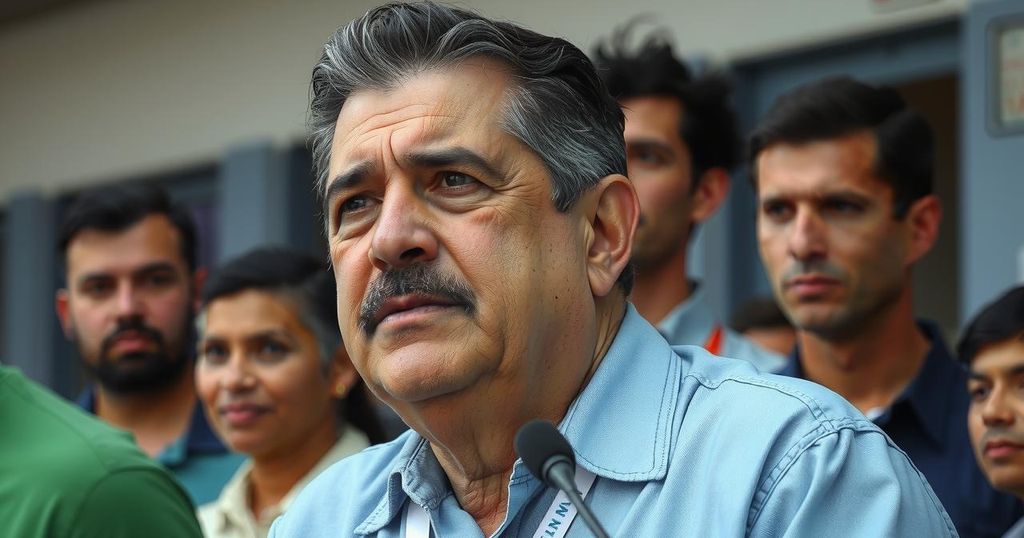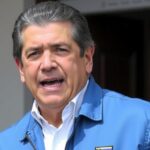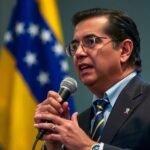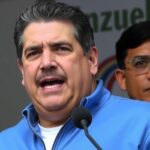Panama Backs Edmundo González in Venezuela’s Election Dispute
Edmundo González, the Venezuelan opposition leader, seeks international recognition of his victory claims against Nicolás Maduro as tensions rise ahead of Maduro’s inauguration. González’s diplomatic efforts in Panama, supported by former Latin American leaders, aim to legitimize his candidacy amidst allegations of electoral fraud. His intended return to Venezuela poses significant risks against the backdrop of governmental repression and international scrutiny.
Edmundo González, the self-exiled Venezuelan opposition leader, is intensifying his diplomatic efforts to gain international recognition of his claim to victory over Nicolás Maduro in the disputed July presidential election. During a press briefing in Panama, he shared what he posited were original electoral tally sheets, asserting that they validate his decisive win. Accompanied by former leaders from Latin America, González met with Panamanian President José Raúl Mulino, showcasing his documents in a significant move ahead of Maduro’s impending inauguration, which has sparked contention across Latin America.
Despite a lack of clear plans from González on how he intends to seize power, his claims have generated regional support, leading to discussions with prominent leaders, including U.S. President Joe Biden and officials from Argentina and Uruguay. Meanwhile, Maduro’s government has responded to the opposition’s assertions with threats, including ordering González’s arrest. Colombian President Gustavo Petro’s refusal to attend Maduro’s inauguration further symbolizes the shifting political landscape in favor of the opposition, opening channels for greater international support.
González’s diplomatic endeavors extend to various nations, with anticipated significant implications from his contentious planned return to Venezuela, where he proposes to take office on Friday. Nevertheless, the backdrop includes a history of electoral fraud allegations and repression from Maduro’s regime, which has continued to target activists following the election. González claims to have gathered evidence from polling stations, bolstering his narrative of an outright electoral theft. The Venezuelan Electoral Authority’s silence on releasing official results has fueled further suspicions of a cover-up.
Panama’s support for González stems from its proactive stance against the Maduro administration, having previously called for a comprehensive investigation into the electoral process. President Mulino’s reassurances to González underscore the extent of Panama’s alignment with the opposition’s cause. As tensions mount in the lead-up to the inauguration, the situation prepares for potential escalation, particularly regarding González’s attempts to assert legitimacy amidst daunting risks. The forthcoming chapters in Venezuela’s political saga promise intense scrutiny as both domestic and international stakeholders assess the unfolding developments.
The current political landscape in Venezuela is marked by significant unrest and division, stemming from allegations of electoral dishonesty during the July presidential election. Nicolás Maduro’s administration continues to wield control through military backing and strategic positioning within key governmental institutions, while the opposition, led by Edmundo González, argues that widespread irregularities tainted the electoral outcomes. González’s self-exile and diplomatic push underscore the dire straits faced by the opposition, as they navigate through government repression and seek international support to reclaim power.
González’s situation encapsulates the broader struggle for democratic legitimacy in Venezuela, as he appeals for support amidst a regime that remains deeply entrenched in power. The international community’s response, particularly from neighboring nations, plays a critical role in shaping the outcomes of this political crisis. With González’s return set against a backdrop of escalating tensions and threats, the coming days will be pivotal in determining the future direction of Venezuela’s governance and the international stance towards its leadership.
Original Source: www.newsweek.com








Post Comment